31 Dec January 2020 Yellowbill
New Board Member Responsibilities
The December meeting of the Fresno Audubon Society board is dedicated each year to performance evaluation and to elect officers and board members to new terms. This year the board elected the following:
Rachel Clark, president
Radley Reep, vice-president
George Folsom, treasurer
Barbara Bailey, secretary
Robert Snow, past-president and The Yellowbill editor
Rich Gilman, board member at large
Nancy Griesser, board member at large
Nancy Gilmore, board member at large
Judy Johnson, board member at large
The board thanked Robert Snow for his eight years of leading Fresno Audubon Society. The board also noted good progress toward our strategic goals of increasing membership and leveraging our impact by working closely with other local conservation groups such as Sierra Foothill Conservancy and the San Joaquin River Parkway and Conservation Trust. We decided on the outline of our first annual report and planned to release it by the end of January 2020.
Please join me in thanking all the members of the board for their continuing dedication to Fresno Audubon Society. It is particularly heroic for Rachel to accept the presidency given that she had only been on the board for one month prior to the elections. All of the board members are committed to making her job less harrowing.
Membership
Membership with Fresno Audubon Society is available for students, for individuals or for families. We also offer a lifetime membership. Your dues will help us pay for our meeting room rental, insurance for field trips, communications and other costs of doing business. Our membership year runs from 1 September to 31 August the following year. To join Fresno Audubon Society or to renew your membership, please visit our website here.
Lost Lake Christmas Bird Count
The 2019 Lost Lake Christmas Bird Count was held on December 14, which was a near-perfect day for birding. The temperature was mild, and although some gray clouds threatened light rain in the early morning hours the skies cleared as the day wore on. A total of 35 participants formed 11 groups to cover the accessible sections inside the count circle. Between the 11 groups, a grand total of 262.7 miles were covered (224.7 by car and 38 by foot), and approximately 79.75 hours were spent counting birds (31 by car and 48.75 on foot). By the end of the day, 125 species had been observed. California Gull was by far the most numerous, with 5,595 individuals observed. The most widespread species were Red-tailed Hawk (185), American Coot (861), Mourning Dove (356), Anna’s Hummingbird (80), Nuttall’s Woodpecker (37), Northern Flicker (96), American Kestrel (53), Black Phoebe (101), California Scrub Jay (151), Common Raven (315), Ruby-crowned Kinglet (193), European Starling (2,994), Yellow-rumped Warbler (507), and White-crowned Sparrow (722), all of which were seen by all groups. Among the least encountered species were Snow Goose (1), American Wigeon (1), Green Heron (1), Common Gallinule (1), Greater Roadrunner (1), Burrowing Owl (1), White-throated Swift (2), Red-breasted Nuthatch (2), Tricolored Blackbird (4), Purple Finch (4), and Pine Siskin (11), all of which were seen in only one section. All told, 26,382 individual birds were counted.
New compiler Rachel Clark would like to thank all who participated in this year’s CBC. Its success would not have been possible without everyone’s help! Anyone wanting a complete species list or any other specific information regarding the count should contact Rachel at either tanagergirl@gmail.com or 515-357-0122.
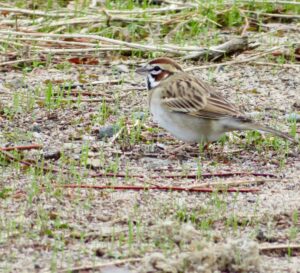
Lark Sparrow by Rachel Clark
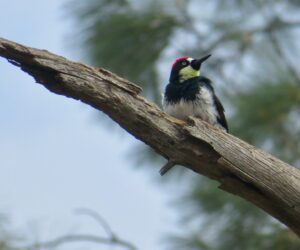
Acorn Woodpecker by Rachel Clark
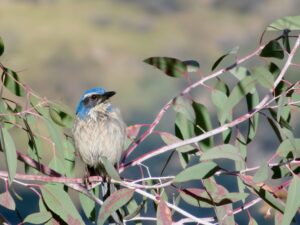
California Scrub Jay by Rachel Clark

Field Trips
Our website has a calendar that allows you to see all the details of upcoming trips as each become finalized. Included in the details is a link to a map showing the meeting point for the trip. The calendar is subscribable, which allows you to integrate it into your electronic calendar. Updates to events will appear as they are made. We encourage you to subscribe. Follow the links within each writeup for more information on destinations and meeting point locations, and to register for the field trip.
New for the 2019-2020 birding season, we have added an event registration page for each outing. This is to provide trip leaders with the expected number of participants. When you register you also sign our liability waiver, which saves both time and paper. We encourage you to register for any event you plan to attend. Tickets for our events are NOT required.
For those who prefer a simple list of trips, you can view or download the one by clicking here.
January Field Trips
Wednesday 8 January 2020 – Northwest Millerton Lake with Rachel Clark
Please join Fresno Audubon on Wednesday, January 8 as we explore the Madera County side of Millerton Lake State Recreation Area. With its array of habitat types, this locally renowned birding destination is an excellent place to find such species as Western Grebe, Clark’s Grebe, Bald Eagle, California Gull, California Quail, Nuttall’s Woodpecker, Rufous-crowned Sparrow, Canyon Wren, Rock Wren, and so many more! As there is a $10 day-use fee per vehicle to enter Millerton Lake SRA, we will be carpooling as much as possible to reduce costs. Once inside the gates, we will drive along the road, stopping at turn-outs and campgrounds to explore the habitat (these will be very short hikes). Once we have finished birding at Millerton Lake, if there is interest and time, we will head to another local birding hot-spot: Road 208 between Highway 41 and Road 211. Road 208 boasts open grassland and oak savannah habitats, and is a great place to find Ferruginous Hawk, Golden Eagle, American Kestrel, Acorn Woodpecker, Western Meadowlark, American Pipit, Vesper Sparrow, and too many others to list! This field trip should last until approximately 2:00 PM. Be sure to dress in layered clothing, and to bring a hat, sunscreen (just in case), water, snacks, and a lunch. Please meet at 7:45 AM in the Walmart parking lot on Blackstone and Ashlan.
Register for this trip is here
Directrions to the assembly point are here
Trip leader: Rachel Clark, 515-357-0122, tanagergirl@gmail.com
Saturday 11 January 2020 – Madera Grasslands with Jeff Seay
Jeff Seay will lead this trip through the Merced Grasslands Important Bird Area finishing at Merced National Wildlife Refuge. Meet at that Walmart parking lot at Ashlan and Blackstone at 6:45 am for a 7 am departure. The trip will cover the Madera County’s foothill Grasslands on the way to the Merced Wildlife Refuge. We expect to see wintering raptors and other birds of the low foothills and grasslands. We will mostly be driving and getting out of the car periodically with possible small walks. At the end of the trip we will enjoy the spectacle of Sandhill cranes, Snow and Ross’s geese, and other waterfowl. It will last most of the day, ending about 5:45 at the refuge.
Checklist: binoculars, spotting scopes, cameras, radios, jackets, lunch/snacks, water, and insect repellent.
Registration for this trip is here.
Directions to the assembly point are here.
Trip leader: Jeff Seay, (559) 960-0849, jeffseay@sbcglobal.net

Sandhill Cranes by Cecelia Sheeter
Wednesday 22 January 2020 – Clovis Urban Birding with Larry Parmeter
Join Larry Parmeter for a morning of urban birding in Clovis. We will meet at the parking lot of the Clovis Botanical Garden, on Clovis Avenue just north of Alluvial Avenue, at 8:30 am, and will bird the Garden and the Dry Creek Park area around it. Then we will go across the street to the ponding basins to the east of Dry Creek, along Alluvial Ave. Finally, we will head back to the intersection of Clovis and Alluvial and check out Cottonwood Park. Lots of waterfowl in the winter, riperian and woodland birds, hawks and even occasional Bald Eagles show up here. We often don’t think of the great birding areas in our own backyards, and we have many such areas right in the middle of the Fresno-Clovis area.
Registration for this trip is here
Directions to the assembly point are here
Checklist: binoculars, scope, field guide, snacks, lunch, water, sunscreen, hat
Trip Leader: Larry Parmeter, lanpar362@gmail.com, (559)288-3456
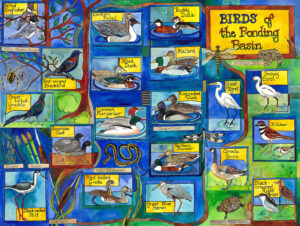
Birds of the Ponding Basin by Kathleen Mattox
![]()
Introduction to Birding Classes
Fresno Audubon Society is offering Introduction to Birding classes at the River Center and at the San Joaquin River Gorge. We thank the River Parkway Trust and the BLM for giving us access to their properties for the classes.
Class participants will learn how to use binoculars, why birding is a fun and valuable hobby, and about the resources available to help identify birds. After the initial class work, participants will accompany Fresno Audubon experts on a bird walk around the property.
Participants should bring binoculars, snacks, water, and sun protection. Fresno Audubon will have binoculars to loan for anyone who doesn’t have their own pair. Children are welcome.
The classes are ongoing, and the following upcoming dates have been set. For registration and more details, click on the dates below.
Coke Hallowell Center for River Studies
BLM San Joaquin Gorge
Fresno-Madera Birds
by Jeff Davis
Including reports for the period of
November 16 to December 15, 2019
The juvenile Yellow-bellied Sapsucker
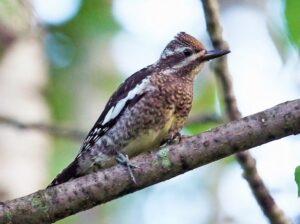
Juvenile Yellow-bellied Sapsucker by Tim Lenz, Macaulay Library ML30950521
at Lost Lake Park discovered October 26 was present at least through December 7 (SE, GE). This species has been observed at Lost Lake Park each winter since 2015 but was unknown in our area until 2007.
Madera County’s second Vermilion Flycatcher,

Female Vermillion Flycatcher by Gary Woods
an adult female along the Madera Canal near Road 400, discovered October 31, was present at least through November 24 (ph. GW). Another, a first-year male, was in Fresno County at Mendota Wildlife Area November 18 (ph. GF, RS).
An adult male Yellow Warbler

Yellow Warbler by Gary Woods
at the Fresno Wastewater Treatment Plant November 16 (ph. GW) was near where one was observed last winter. This species is less than annual in winter in our area.
Cited Observers: Gregory Estep, Susan Estep, George Folsom, Robert Snow, Gary Woods. ph. = photographed by.
If you make an interesting observation, we’d love to hear about it. We are especially interested in birds listed as casual or rare on the Fresno Audubon checklist and those found out of season, out of normal habitat, or in unusually large numbers. Please submit reports to Jeff Davis (559-246-3272, jndavis@ucsc.edu), the Fresno County Birders e-mail list, or eBird.
Birds in the News
Links to Recent Articles on Birds
A Field Guide for the Entire 21st Century
A new project reveals not just where birds live now—but where they’ll live decades from now. Read more…
Barn owls reflect moonlight in order to stun their prey
Ecosystems that are bathed in light during the day change profoundly at night. As the sun fades from the land, nocturnal life emerges, with the barn owl (Tyto alba) among them. Barn owls are iconic nocturnal birds of prey that are found all over the world, often near towns and villages. Although a familiar species to many, there is still much we don’t know about them. Read more…
The Mystery of the Disappearing Seabird
To change the fate of the kittiwake, scientists are trying to model its world. Read more…
Bird migration timing skewed by climate, new research finds
Life cycles for birds, insects and trees are shifting in this current era of a rapidly changing climate. How migration patterns, in particular, are changing and whether birds can track climate change is an open question. Read more…
Transition to renewable energy needs to consider global threat to species
A new study has shown the extent to which countries drive biodiversity loss overseas through their demand for electric power. For some countries more than half of the impact on species is overseas. While the study found that the shift towards renewable electric needed to combat climate change would likely reduce the impacts on biodiversity, the overseas impact makes it difficult to understand how “green” our electric really is. Read more…
Slaughter of the songbirds: the fight against France’s ‘barbaric’ glue traps
French hunters claim tradition justifies their exemption from EU rules. But with many species endangered, there is growing pressure for a ban. Read more…
The mysterious case of the ornamented coot chicks has a surprising explanation
The American coot is a somewhat drab water bird with gray and black feathers and a white beak, common in wetlands throughout North America. Coot chicks, however, sport outrageously bright orange and red feathers, skin, and beaks. A new study explains how the bright coloring of coot chicks fits in with the reproductive strategy of their less colorful parents. Read more…
Member Photographs
Fresno Audubon members have been submitting some really terrific photographs to this column. If you would like to add yours to the mix, please send your photo in jpeg format to rsnow@fresnoaudubon.org with a brief description, where the photo was taken and how you want the photo credit to read. Birds may be from anywhere. Limited space may restrict publication to a later issue. We now have an Instagram site (@fresnoaudubon), and we will showcase photos there as well with your permission.
George Folsom
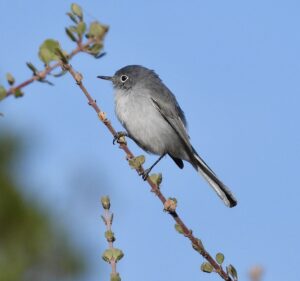
Blue-gray Gnatcatcher by George Folsom. Sycamore Island, December 2019
Jacob Smith
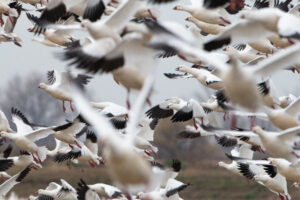
Ross’s Geese by Jacob Smith. Merced NWR December 2019
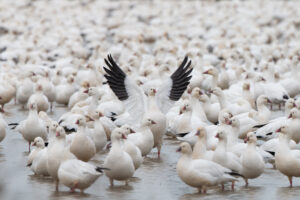
Snow Goose among Ross’s Geese by Jacob Smith. Merced NWR December 2019
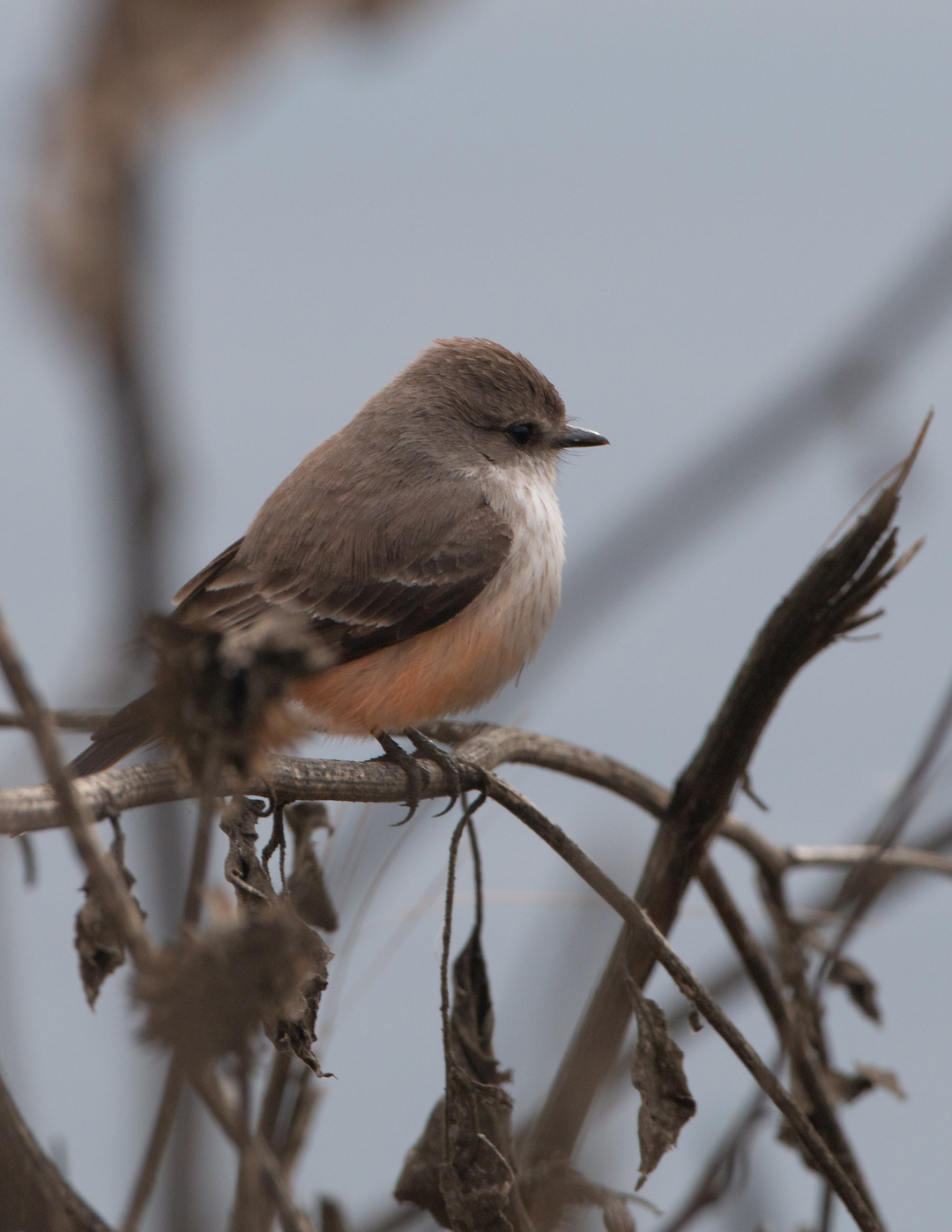
Vermillion Flycatcher (female) by Jason Smith. Merced NWR December 2019
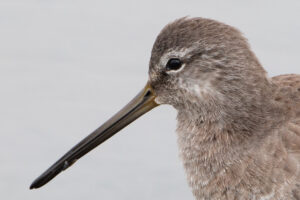
Long-billed Dowitcher by Jacob Smith. Merced NWR December 2019
Larry Cusick

Great Blue Heron by Larry Cusick
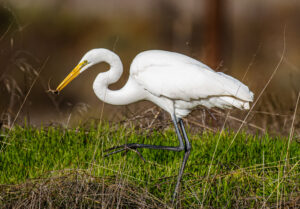
Great Egret by Larry Cusick
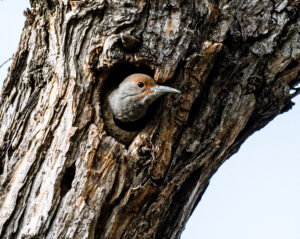
Northern Flicker by Larry Cusick
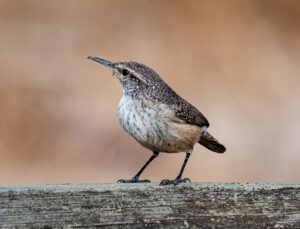
Rock Wren by Larry Cusick
Micki Beston
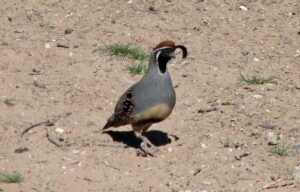
Gambel’s Quail by Micki Beston. Dead Horse State Park, AZ
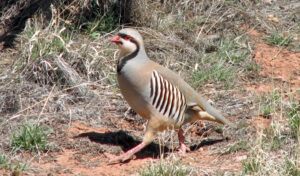
Chukar by Micki Beston. Utah
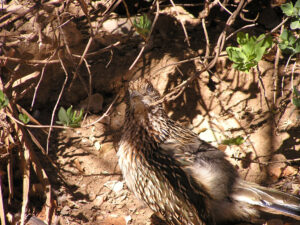
Greater Roadrunner by Micki Beston. Catalina State Park, AZ
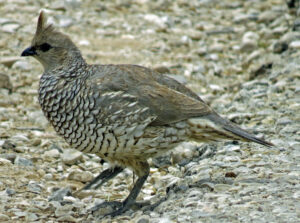
Scaled Quail by Micki Beston. Brantley Lake State Park, New Mexico
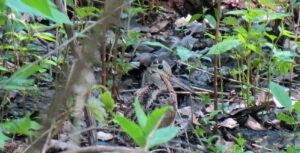
American Woodcock by Micki Beston. Ohio
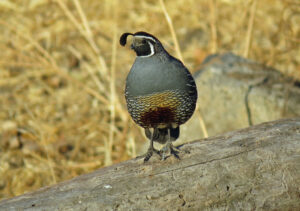
California Quail by Micki Beston. California
Sandy Silva
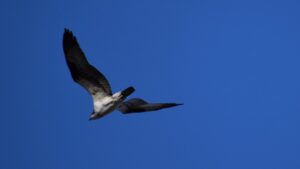
Osprey by Sandy Silva. Sycamore Island, December 2019
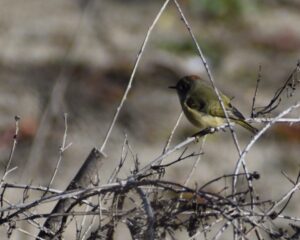
Ruby-crowned Kinglet by Sandy Silva. Sycamore Island, December 2019





Sorry, the comment form is closed at this time.